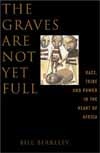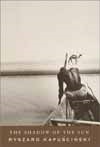Alexis Beggs Olsen
An Immensely Rich Cosmos

The Graves Are Not Yet Full
by Bill Berkeley
Basic Books, 2001
304 pp.; $27.50
"This is a book about evil," Bill Berkeley warns the reader at the beginning of The Graves Are Not Yet Full. "Its setting is Africa." Evil, he's reminding us, has no particular address: "These stories are a measure of how much Africans have in common with the rest of mankind, not how much they differ." Berkeley, who spent ten years reporting on Africa for The New York Times Magazine, The Atlantic Monthly, The New Republic, and the Washington Post, writes with an easy authority. His central argument is that—contra what we've been told repeatedly, especially in the wake of the Hutu massacre of the Tutsis in Rwanda—ethnic hatred is not the primary cause of bloodshed in Africa; rather, it is a tool deftly used by "Big Men" to create anarchy, which allows them to stay in power. Instead of focusing on victims, Berkeley meets and describes the tyrants. His aim is to describe how evil people operate and how they gain and stay in power. Most of his subjects are African warlords and political kleptocrats.
In Liberia, Charles Taylor attempts to legitimize his campaign of terror, which left 150,000 dead and half of the nation displaced in a prolonged civil war. One of Taylor's tactics was to recruit drug-addicted war orphans to serve in so-called Small Boy Units, fanatically loyal to Taylor (their "father") and willing to rape and kill without restraint. Yet Taylor blandly presents himself as a statesman dedicated to his people. In the Democratic Republic of the Congo (formerly Zaire), Berkeley and his wife are detained for four days by SNIP, Mobutu Sese Seko's secret police, after interviewing victims of state-sponsored ethnic aggression in the south of the country. We listen to General Pieter Hendrik "Tiene" Groenewald, South Africa's chief of military intelligence in the mid-1980s, explain his government's instigation of tribal violence to aid in the fight against Nelson Mandela's African National Congress. And we hear the voices of agents of genocide in Rwanda—from political leaders to villagers who acted in fear for their own lives.
In Sudan, Berkeley interviews the Arab religious leader and two independence fighters largely responsible for 2 million deaths since 1983 and a displacement rate of 85 percent in the southern part of the country. Hassan al-Turabi is the Islamic leader who issued a fatwa exhorting the Islamic faithful to jihad against the Christian and animistic South. The puppet-master behind several political leaders, al-Turabi is responsible for purges, torture, and state-induced famine. John Garang and Riek Machar fought together against the Arabic Islamic North, before turning on each other and inciting a war between the two largest black tribes in the country. Both factions are known for widespread human rights violations, for which neither leader seems willing to accept responsibility. "I don't feel responsible for the deaths. We all want to fight for our liberation. So we pay a high price," said Reik after one massacre. Garang also dismisses his role. "There are individuals who rape and steal. But what I want to underline is that is not the movement." Explaining his role to Berkley, Turabi said, "There is a vacuum now. That vacuum is being filled by an Islamist spirit. I just happened naturally to be on the track where history is moving." With a little tweaking, their words of self-justification could have come from Serbia. All three leaders have ph.d.'s, from England, the United States, and France.
In each of these accounts, Berkeley deftly mixes historical background and firsthand reporting to show how political leaders use the absence of functional institutions of law and accountability to maintain or increase their own power and wealth: "It takes leadership, operating in a context of great political upheaval and insecurity—and impunity—to translate hostility and suspicion into violent conflict. The challenge for the beleaguered despot with his back against the wall is to harness that resentment—to stoke it, channel it, even arm it, in order to destabilize opponents and discredit alternatives to the status quo."
While Berkeley intends to universalize the evil he so meticulously documents, the sheer scale of the atrocities he describes may tempt readers to do otherwise, to read his book as an account of uniquely African horrors. Berkeley may have done well to draw parallels between the events he decribes and similar ones in Asia, Latin America, and in the recent history of North America and Europe.

Looking for Lovedu
by Ann Jones
Alfred A. Knopf, 2001
268 pp.; $25
If genocide and tribal violence represent one extreme on the continuum of our commonly traded images of Africa, then exotic adventureland would be the other extreme. That's the mode of Ann Jones's idiosyncratic travelogue, Looking for Lovedu.
With Kevin Muggleton, a British photographer, Jones hatches a plan to drive across Africa. To give the expedition legitimacy, and to aid in raising sponsorship, the duo propose to search for Modjadji V, the Rain Queen of the Lovedu ("low-BAY-doo," also sometimes spelled "Lobedu"), a tribe where women rule. In this African version of Shangri-La, set in a high valley surrounded by mountains in the northern region of South Africa, the Lovedu place "the highest value on traditionally 'feminine' ideals: appeasement, compromise, cooperation, helpfulness, tolerance, generosity, peace." Framed thus, Jones's plan may sound rather dramatic. In fact, there was no mystery about where to find the Lovedu. As the obituaries reported when Queen Modjadji died in June of this year, politicians, Africanists, curiosity-seekers, and assorted supplicants regularly made the pilgrimage to see the rainmaker. But the "quest" serves its purpose, as Jones confesses at the beginning of the book: "the Queen was really nothing to me but a good excuse for gallivanting."
After months of preparation, Jones and Muggleton set out from London in a Land Rover heading south through Europe and enter Morocco, proceeding directly to Mauritania. They drive through the Sahara and pass through Senegal, Mali, Cote d'Ivoire, and Ghana. Most of the description focuses on difficult border and police officials and the company of other "over-landers" from Europe and Australia, with whom Jones and Muggleton travel for the early part of the journey. Jones sprinkles in historical background of each country, but we meet precious few Africans, and indeed see little of Africa apart from what is visible from the front seat of the car as it careens along bumpy roads. At one of the few stops along the journey, at the Basilique de Notre Dame de la Paix in Cote d'Ivoire, Jones laments that those who built it "bought the whole egocentric Western package: capitalism, Christianity, modern technology, monumental architecture."
Jones finds herself in a predicament. Despite obtaining ample funding (they are traveling with a Compaq laptop, Nikkon binoculars, and "thousands upon thousands of dollars worth of state of the art gear"—what was that about "the whole egocentric Western package"?) and despite Muggleton's youth (he is half her age), Jones doesn't seem to be able to influence him to slow down and experience Africa. Eventually she leaves him in Kenya and proceeds with two new traveling companions, both women: Caro Hartsfield from Australia and Celia Muhonuja from Kenya. Finally, on the last leg of the journey, we begin to meet Africans.
Jones's encounter with the Rain Queen? A rather disappointing two hours translated through two interpreters who don't seem to be conveying Queen Modjadji's sotto voce comments. (That's a pity; judging from the obituaries, she was a memorable character.) Jones's attempt to make it seem like a transforming encounter falls flat. It is a fitting anticlimax to a book that celebrates the willful self-indulgence of a glorified Tourist.

Looking for Lovedu
by Ryszard Kapuscinski
translated from the Polish by Klara Glowczewska
Alfred A. Knopf, 2001
325 pp.; $25
With Ryszard Kapuscinski's new book, The Shadow of the Sun, we move into entirely different literary territory. In more than four decades of global coverage for the Polish Press Agency, Kapuscinski has witnessed 27 coups and been sentenced to death four times. He is the author of many books, of which the best known is The Emperor: The Downfall of an Autocrat, an account of the last years of Haile Selassie I through the eyes of his courtiers. A masterful storyteller with an eye for the luminous detail, Kapu´ sci´nski's arrived by his own devices at a form somewhat like the "nonfiction novel" of Truman Capote and Norman Mailer. Indeed, his critics have charged that there is too much novel and not enough nonfiction in Kapu´ sci´nski's books.
The Shadow of the Sun is an episodic account of his "40-year marriage with Africa." While he has traveled widely, he has returned repeatedly to Africa since his first sojourn in Ghana in 1957. "The continent is too large to describe," he says. "It is a veritable ocean, a separate planet, a varied, immensely rich cosmos. Only with the greatest simplification, for the sake of convenience, can we say 'Africa.' In reality, except as a geographical appellation, Africa does not exist."
Kapu´ sci´nski has a gift for meeting, observing, and listening to ordinary but fascinating people. Rather than living in the expatriate community in each city of residence, Kapuscinski chooses to immerse himself in the local community. "You often see two (or more) people standing in the street and dissolving with laughter," he writes. "It does not mean that they are telling each other jokes. They are simply saying hello."
Even in the midst of reporting on high-profile events (including racing from one newly independent country to another in the heady days of the '50s and '60s), he makes countless friends, and he tells us about them. These friends then help to interpret the surrounding events. In this way, Kapu´ sci´nski gives us a glimpse of some of the many facets of Africa: colonialism, family, the process of independence, tribalism, gift-giving, malaria, settlement patterns, meal pre-paration, development, forced labor and slavery, humor, swelling cities and slums, friendship, traditional spirituality, civil service, lush jungles, home-brewed beer, literature, nomadic life in the Sahara, celebrations, children soldiers, missionaries, aids, steam locomotives and their passengers, political despotism, Asian immigrants, Apartheid, market women, deforestation, and life-saving acts of kindness from strangers.
In his passion to convey all this and more, Kapu´ sci´nski is true to the "mission" he described to an interviewer[1] some years ago:
Why am I writer? Why have I risked my life so many times, come so close to dying? Is it to report the weirdness? To earn my salary? Mine is not a vocation, it's a mission. I wouldn't subject myself to these dangers if I didn't feel that there was something overwhelmingly important—about history, about ourselves—that I felt compelled to get across.
Kapu´sci´nski insists on the multiplicity and particularity of Africa and Africans, on the strangeness of this "separate planet," but he doesn't stop there, with an unfathomable Other. Like Berkeley, he's also telling us stories about ourselves.
Alexis Beggs Olsen is technical advisor with Opportunity International, a Christian microenterprise and development organization based in Oak Brook, Illinois.
Footnotes
1. Kapu´sci´nski was interviewed by Bill Buford in Granta 21 (Spring 1987), pp. 81-97.
Copyright © 2001 by the author or Christianity Today/Books & Culture magazine.
Click here for reprint information on Books & Culture.








Displaying 0–0 of 0 comments.
Displaying 0–0 of 0 comments.
*